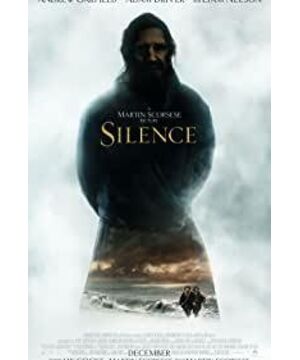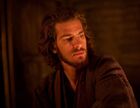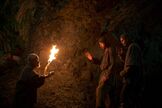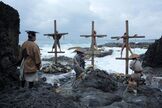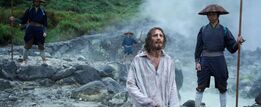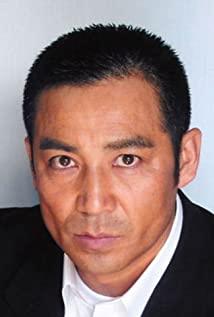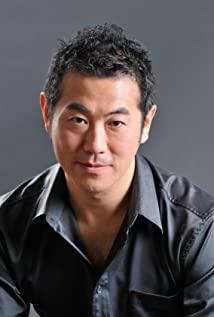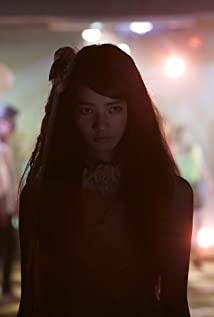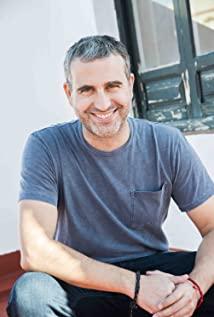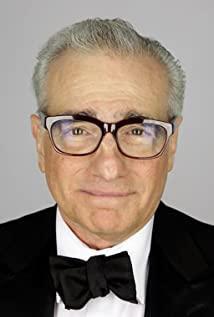The laboratory has a very good friend who is a Christian. In Chinese society, there are actually very few people with such Western beliefs. I will ask her if you are Christian or Catholic. She looked me in the eyes very seriously and said, I don't believe in religion, I believe in Christ. I was a little taken aback when I first heard it. By chance, she took me to a Christian gathering. All the believers in Christ sat in a cramped little house, singing hymns, reading the Bible, and praying together. The slightly raised face of the individual praying, the bright light illuminates their closed eyes, and outside the window is the silent night in the secular community. I was a little shocked, shocked by the frenzy, that day was probably the closest I was to religion in real life.
Movies about religion are rarely watched. If the "Blood Battle Hacksaw Ridge" was considered half a religious movie a year ago, and "Silence" was added, I only watched this and a half.
Silience, when I first saw the movie, I didn't understand why he named it after that. The first appearance of this mother was probably in the 50th minute. The three villagers who initially received Rodriguez were tied to the reef by the sea and washed over and over by the tide. Rodriguez said that he When he died, he sang a hymn, and there seemed to be only his singing and the sound of the tide between heaven and earth, and the villagers on the shore were silent. Silence was mentioned for the second time. Not long after this scene, when Father Rodriguez and Gape were about to run away, they had just witnessed the martyrdom of three devout believers in his eyes. All of them said sadly, Lord. , why are you silent, I don't know how to explain your silence to them. In fact, the appearance of the word Silience this time is really considered to be mentioned as a mother. Because the whole movie is trying to explore what faith is through such an extreme historical event. Of course, this movie is so grand and far-reaching, it can be mentioned and analyzed from countless angles, such as the "infertile woman" in the mouth of the Japanese chief, the story of four concubines full of metaphors, but I just want to choose this angle , come and talk nonsense.
What exactly is faith, this question, I have asked myself many times. As an atheist, I have also been arrogant in the past, just like my disdain when facing a group of people who are praying fervently in front of me, I disdain to have faith, because I arrogantly think that faith will only make People become narrow-minded. At the beginning of the movie, in order to believe in the people who come out at night and day, their fingers are full of black mud, but they still use these hands to pray, even Rodriguez, who first saw them, was moved, under such extreme and difficult conditions Next, they did not forget to pray before eating, which seems to be incomparable even to priests from the civilized world. The villagers held Rodriguez's hand excitedly and said, Lord, he did not give up on us, our prayers were heard, Lord, he sent priests to you! Since the first time I watched the film, I was also very moved. The villagers were so enthusiastic about the priest and their faith was so firm, but they always felt that something was weird. Until the second time I watched the film, until I heard the end of the film, Father Feilai When Ra said, all the strange places finally became clear. Yes, what exactly do they believe in? Is it the unseen and intangible God high above? No, they believe in the rules and regulations of this religion. Even if they are dying of starvation, they can't forget to pray before they eat. It is an idol placed in the mud that they don't want to trample. Small things, even the living priests themselves like Rodriguez, Gape and Ferrera.
When Rodriguez accused the apostate Ferreira, he may have forgotten that he himself once said to the villagers who went to the execution, trample on the idol, it doesn't matter; In the tide, Gape cried out in his heart to abandon religion and abandon religion. But when he really faced the apostate Ferreira, he suddenly became so intolerant, perhaps because, in his heart, Ferreira had always been the leader of his spiritual world and the direction he was chasing. He can easily forgive those who are weaker than him, but he can't let go of himself and Ferreira. He can accept all Japanese believers to abandon the religion, but he can't convince himself to abandon the religion. Personal apostasy is the panacea that can save everyone.
But Ferrera is much more transparent than him. Did Ferrera really give up teaching? I don’t think so. In the end, I even thought that Ferrera was the one who truly had faith. When Rodriguez and others were still praying to the cross and enshrining the icon as a treasure, Ferrera had already seen through it. everything. True belief is boundless and intangible. It is not an oath and promise, not a clause that must be abided by, not everything materialized in this world, and clinging to everything that is visible is not belief, but stubbornness. The real faith is nothingness... It is really to tolerate and help, to really save. As if what Ferrera said to Rodriguez before he collapsed, what would he do if Jesus existed here, he would give up teaching to save people! ! Are tangible things really that important? Is a wooden icon really more important than human life? No, that's not what faith should be like.
I think that neither Ferrera nor Rodriguez have turned their back on Jesus in the true sense. This point, the director also clearly explained and implied: Ferrera calmly said to Rodriguez when checking smuggled religious objects. Here, my lord; Rodriguez died with the cross in his hand. You see, how ironic the world is, when Rodriguez defended Christ wholeheartedly and was unwilling to apostate, did he get an echo? No, all silence. And when he was about to abandon religion and trample on the idol, for the first time, there was an echo of Jesus.
I would also like to talk about the characters of Father Gape and Yoshijiro.
Father Gape is a more persistent believer than Rodriguez. It can be seen in the scene where the two of them send off the villagers to be sentenced to death. Rodriguez tells everyone, trample, it doesn't matter if you trample, Father Gape But firmly said, no! How can you trample on an icon? ! It is easy to break through, how paranoid and simple a letter is, and how difficult it is to see through. After the scene where the villagers were executed by the sea, Gape was even more confused and suspicious than Rodriguez, but even so, he still died without abandoning his religion. In the scene where he was martyred by the sea, he still didn't see it through, and he could see his desperate desire to save people, but he chose the least effective or even the most useless way, which was to die. The director put two people with similar background experiences in the same environment, and arranged for one of them to die as a martyr and the other to survive. The different endings are enough to show the director's tendency to answer the moral dilemma of faith and persecution.
Yoshijiro is an outlier among them all. He was not a true believer, but he never gave up teaching. Nor was he bound by all things materialized, he was always the first to step on the icon of Jesus and the first to spit on the Virgin. Is there a difference between him and Father Ferrera? I think there is. First, all the motives of Jijiro's actions are only to save himself, while the motives of Ferreira's actions are essentially the same as Jesus, all to save others; second, Jijiro is not complete and unbound, he is bound by one thing, That was repentance, whenever he did something he knew was against the teachings, he needed to confess to Rodriguez, and after repentance he seemed to have new strength to do the next thing against the teachings, which was very Like ordinary Christian villagers, they need to pray every day, and they can continue to endure persecution after each prayer.
Finally, I want to talk about the fog that haunts the first half of the movie. At the beginning of the film, Godfather Ferrera faced oppression in a thick fog; when Rodriguez first landed on the island, it was also foggy; when Rodriguez left the village where he first stayed to go to Jijiro's village, the boat Walking in the fog, I couldn't tell whether the person who came was an enemy or a friend; the first time the Fengxing Institute came to the village to catch Christians, the officer rode out of the fog on horseback. This is the first appearance of the head of the Fengxing Institute. Before this, all the news about oppression and arrest was told to Rodriguez by others. He had never seen it with his own eyes, until this scene and the subsequent scene at the seaside, For the first time, he actually witnessed the persecution of Christians by the Japanese government, and after that, the fog disappeared. I think the fog is probably a kind of uncertainty in Rodriguez's heart, an external manifestation of the unknown of the dangers that lie ahead. All the dangers before were audiobooks, and he had never seen it with his own eyes, experienced it himself, as if all the darkness and danger were hidden behind the thick and confused fog, and he would never know anything unless he passed through it. In the first half of the movie, there are many night scenes, heavy fog scenes and heavy rain scenes, but in the second half, all the means of persecution have been nakedly displayed in front of the protagonist's eyes, and it has become a lot of scenes under the sun, because by this time, There is nothing worth hiding, and there is no chance of any luck anymore. The road ahead is like being exposed to the sun, clear and clear, oppressing, oppressing, oppressing all visible beliefs, only by breaking through this visible shackles can we escape from silence. Hear the sound.
View more about Silence reviews


